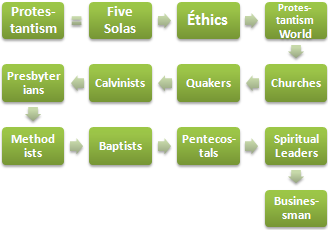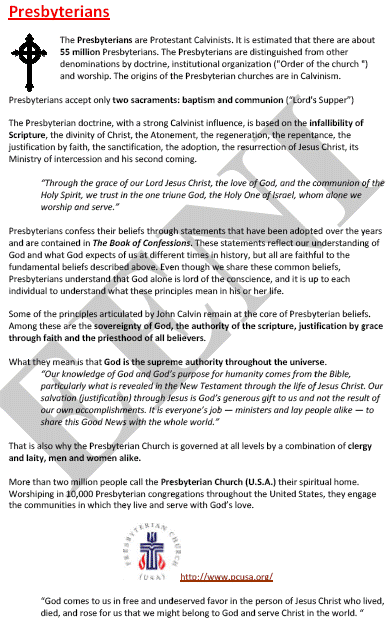Protestants and Business, Ethics (Five Solas)
Protestantism (Christianity): Ethical Principles. Quakers, Pentecostals
Protestantism includes a large number of Churches (Calvinists, Lutherans, Baptists, Pentecostals) that refuse the Papal authority; they accept the principles of the Reform (“Righteousness by faith”), the possibility that any believer can be a priest, and above all the Bible as the authority and source of truth (Sola scriptura).
Of the 2,100 million Christians, there are about 800 million Protestants in the World.


Religions and Global Business -
Religious diversity
The Subject “Protestantism, Ethics and Business” (Christianity) consists of four parts:
1- Introduction to Protestantism
- Foundations of Protestantism: justification by faith
- Principles of the Protestant Reformation: The “Five Solas”
- The figure of Luther
- Ethical Principles of Protestants
- Protestant Work Ethic
- Protestantism in the World
- Protestantism as one of the pillars of Western Civilization (Europe-America)
2- Major Protestant Churches:
3- Protestant Businesspeople
- Pentecostals: Howard Ahmanson, Steve Strang, and Cyril Ramaphosa
- Baptists: S. Truett Cathy
- Methodists: Ray L. Hunt
- Presbyterians: Philip Anschutz
The educational aims of the Subject “Protestants, Ethics and Business” are the following:
- To learn about pillars of Protestantism
- To understand the Ethical Principles of Protestants
- To learn about the influence of Protestantism on business
- To analyze the figures of Protestant Entrepreneurs and Personalities
- To learn about presence of Protestants in the world
- To explore the role of Protestantism on Western Civilization

The Subject “Protestants, Ethics and Business” is included within the curriculum of the following academic programs at EENI Global Business School:
Masters: Religions & Business, Business in Africa

Doctorate: Ethics, Religion & Business, African Business.

Languages:  (or
(or  Protestantes
Protestantes  Protestants
Protestants  Protestantes).
Protestantes).
In 1054 there was the first great schism between Orthodox Christianity (Eastern) and Catholic (West). In the sixteenth century, the other main division occurs: Protestantism.
Besides the religious cause; we must also take into account the economic, political, or social factors for understanding this schism.
When analyzing the differences between Protestantism and Catholicism student can be surprising, since ultimately the fundamental differences are not of confessional type, but rather on importance that each of these Protestant churches gives to certain concepts.
The “Five Solas” synthesize the principles of this reform movement.
- Sola Scriptura (“by Scripture alone”)
- Sola Fide (“by faith alone”)
- Sola Gratia (“by grace alone”)
- Solo Christo (“Christ alone” or “through Christ alone”)
- Soli Deo Gloria (“Glory to God alone”)
| Major Protestant Churches Lutherans Calvinists Methodists Baptists Pentecostals Anglicans Quakers |
People (1) 75 85 (2) 70 100 250 85 0.3 |
Countries Germany, Scandinavia The United Kingdom, the Netherlands, the United States, South Korea, Latin America, and Sub-Saharan Africa The United Kingdom, the United States, and Sub-Saharan Africa The United States (Majority of Protestants) and Latin America. The United States, Latin America, Sub-Saharan Africa, and South Korea. The United Kingdom The United States |
(1) million people
(2) 50 million Presbyterians, 30 million Congregational, and 5 million reformed
(3) Some Mormons are considered Protestants and others not.
H.E. PhD Nkosazana Dlamini-Zuma (Chairperson of the African Union) is Protestant.
Protestants, Ethics and Business

Religions and Ethics: Zoroastrianism, Jainism, Hinduism, Buddhism, Taoism, Confucianism.
(c) EENI Global Business School (1995-2025)
Top of this page










 WhatsApp
WhatsApp